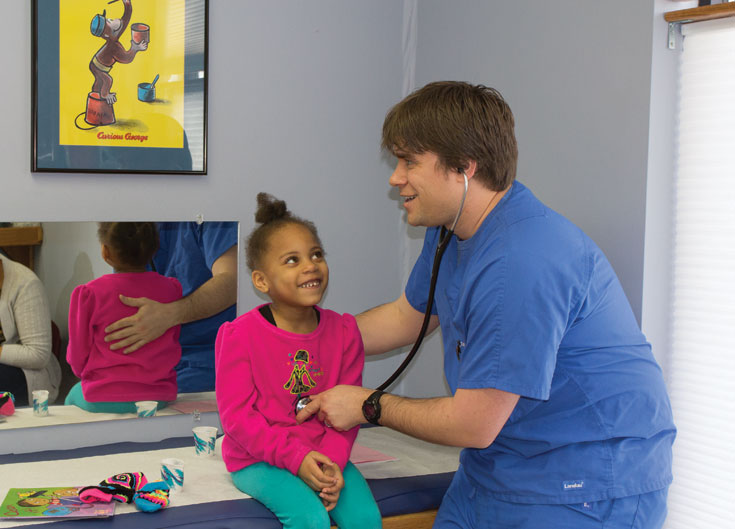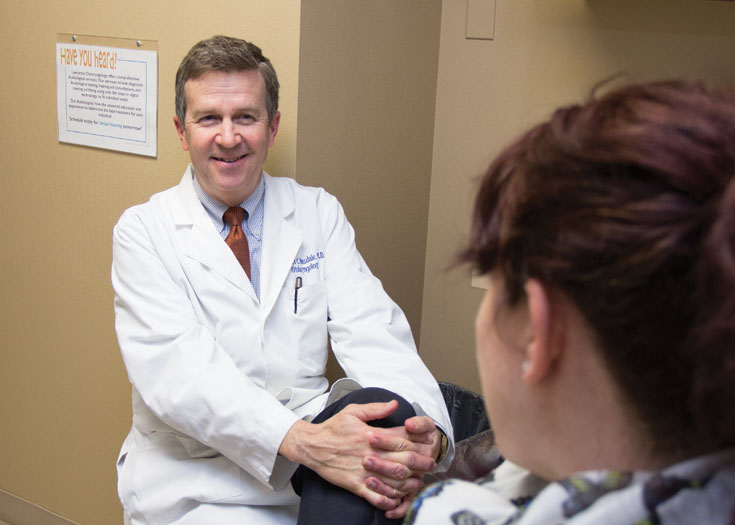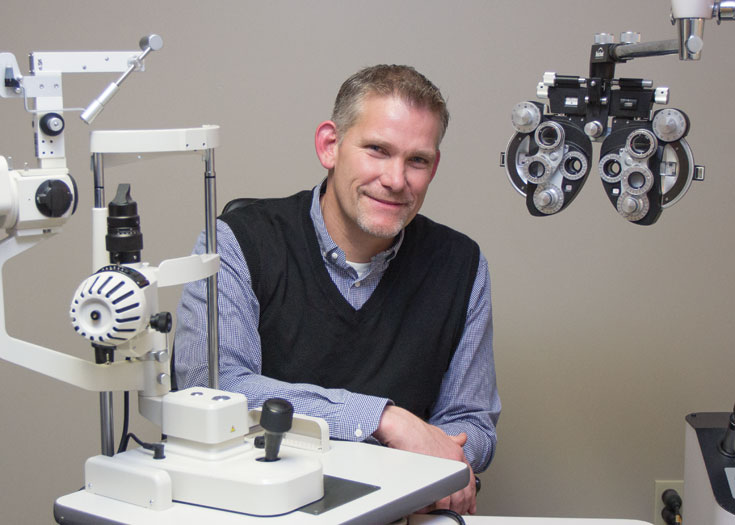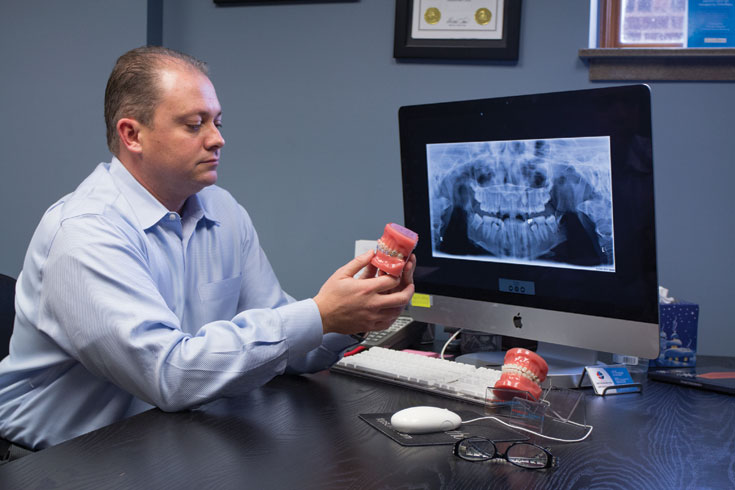| 2015 Q1 | story by TARA TRENARY | photos by STEVEN HERTZOG |

Dr. J. Waco Goodnight
From the Internet to health specialists to self-proclaimed wellness gurus, these days, there’s an overwhelming amount of information about the best ways to keep your health in tip-top shape. Sometimes, one reliable source of information says one thing, and another equally acclaimed source says something completely different. So how do you know what’s the best advice to follow? We asked top local specialists the best ways to maintain good health rather than simply correcting poor health. Here are their suggestions:
When should a patient see a doctor in your field?
Dr. Pamela Huerter, MD, Lawrence Family Medicine and Obstetrics (Primary Care):Primary care is the entry point for most medical concerns, and in family medicine, we are trained to be able to at least, initially, see anyone for anything. Most common medical concerns, both problems and routine care, can be addressed by a family medicine specialist. Any subspecialty care can be referred to through a primary care physician. All primary-care physicians supervise preventive health needs, such as routine checkups, vaccinations and routine lab screening. Common problem visits include upper-respiratory infections, urinary-tract infections, headaches, back pain and depression.
J. Waco Goodnight, MD, FAAP, Pediatric and Adolescent Medicine, PA (Pediatrics): I am a primary-care provider, meaning that patients typically see me first with any particular medical concern; and I also handle their well checkups, which are for monitoring known health problems and preventing future ones. Most commonly, parents bring their children in for coughs, fevers and yearly checkups.
Robert C. Dinsdale, MD, Lawrence Otolaryngology Associates (Ear, Nose and Throat): We see patients directly for ear, nose and throat problems, as well as by referral from their primary physicians. If something in your head/neck area has changed, and it isn’t getting better in two weeks, it is worth having us evaluate it. We see a lot of children with ear and throat infections, adults with sinus issues, all ages with hearing issues and adults with facial skin cancer.

Dr. Robert C. Dinsdale
John Harvat, OD, The Eye Doctors (Optometry): We recommend yearly eye exams. The three biggest reasons people come to see us are (in this order): trouble with their vision, eye irritations/red eyes and a family history of eye problems.
Matthew J. Brown, AuD, CCC-A, F-AAA, Kaw Valley Hearing (Audiology): A patient should see an audiologist if he or she is having difficulty communicating in any situation. Some of the more common complaints from patients are that they feel they can hear what is being said but often misinterpret the message. Asking for repetition, difficulty communicating on the telephone and turning the television up may be an indication the individual may want to obtain a comprehensive hearing examination. Hearing loss has been shown to have effects on an individual beyond hearing, which may include: social isolation, depression, tinnitus and difficulty with memory.
Kyle Anderson, MD, Kansas Medical Clinic (Dermatology): If a patient has a lesion that is bleeding, changing or painful, it’d be wise to come in and make sure it’s not cancerous. Well people should also see us for skin exams, prevention of skin cancer, persistent rashes and every six months after skin cancer.
Dr. Chris Wertin, Advanced Chiropractic Services (Chiropractics): Most people consider that chiropractors are “back and neck” doctors. However, a more accurate description would be “function” or “health” doctors. As chiropractors are experts in natural health care, paying extreme attention to the function of the body, anyone who is interested in restoring or maintaining their health should consult a doctor of chiropractic. Most commonly, people seek out the help of a doctor of chiropractic when they have obvious pains and discomfort that they would like help getting rid of. It is very common that people seek us out after they have already tried other forms of health care with little or no result.
Dr. Kelli Henderson, DDS, Growing Smiles (Pediatric Dentistry): Within six months of the first tooth erupting or by age one. Most people seek out dental care for their children as a preventive measure, but other times, it is because of tooth pain or facial trauma.
Dr. Brent C. Wood, Oread Orthodontics (Orthodontics): The American Association of Orthodontics recommends seeking an evaluation from an orthodontist around age eight. The majority of the patients in my office do not receive treatment until their teenage years, but some problems can only be corrected at a young age. Most common consultations are due to teeth malalignment causing problems with correct occlusion, cleaning of teeth or all-around esthetics.
Are routine exams important in your field to maintaining optimal health? Why are they important? How often should people get them?
Huerter: The purpose of routine exams is to identify health concerns before they become symptomatic or severe. Every adult should have his or her blood pressure checked at least once every year. Young adults without any chronic issues do not require a physical every year, but should seek some sort of preventive medicine exam with screening lab work every three to five years. Older adults and those adults with any chronic diseases should have the status of those conditions evaluated every six to 12 months if they are stable, and more frequently if they are not well controlled. Children should have an evaluation of growth and development every year. Screening tests often discussed during a preventive exam include mammography, colonoscopy and bone-density testing. This is also a time when routine lab work would be discussed.
Goodnight: Routine exams are extremely important. I look at them as a way to thoroughly look at a patient from every angle, which allows me to continue current care of known health problems, detect previously undetected health problems and anticipate and prevent future ones. Visits for a single problem, i.e. sick visits, do not allow me to perform the same kind of medicine I’m able to practice when doing a “well check.” The time between well checks is dependent on age.
Dinsdale: Routine screening exams are not usually done in our field, because most serious conditions in the head and neck give you symptoms. I would say be aware and honest with yourself so you don’t dismiss those symptoms and miss the chance to resolve them. Protecting your ears from noise, protecting your skin from the sun, protecting your voice from abuse and not smoking are the ways to maintain optimal health for our region of the body.

Dr. John Harvat
Harvat: Routine exams are important in our field. People can develop various eye diseases, such as glaucoma, that are asymptomatic. They do not even realize they have a problem, which can make treatment more difficult and less successful. Many different systemic problems in the body, like diabetes, high blood pressure and cholesterol, can also show up in the eye.
Brown: An annual examination may not be warranted. However, if a patient recognizes a change in hearing, it would be advised to have it evaluated. When having a hearing examination, it is important to have tests completed that can examine all parts of the ear. Results obtained should include the appearance and function of the outer, middle and inner ear. These tests may include otoscopy, tympanometry, air and bone conduction, and speech recognition. Other test may be warranted depending on the results obtained above.
Anderson: Once you hit 50, it’s recommended on a yearly basis; every six months after cancer and yearly, if younger with skin issues. Every two years is fine without.
Wertin: Routine functional assessments are very important in maintaining proper health. In fact, most doctors of chiropractic complete these assessments every time they evaluate and render care to their patients. These exams can be very thorough, or they can be an ongoing progressive evaluation of the patient to ensure that the goals of care are realized. The purpose of care is to restore and maintain good health and function, and these evaluations help the patient and doctor monitor and achieve these goals.
Henderson: Routine exams are critical in dentistry because so many oral disease processes are symptom free to the patient for a long time. Many times, once the disease process has created a symptom for the patient, it is very progressed. For early detection, we recommend dental exams at least every six months.
Wood: Periodic monitoring of teeth allows the orthodontist to advise parents and patients on the optimal time to begin treatment. This can lead to the best results with minimum intervention. When treatment is complete, routine follow-up appointments are needed to assess long-term stability and retention options.
If there’s a history of disease in a person’s family, how important is it for him/her to take that into consideration when trying to maintain optimal health?
Huerter: Knowing individual family history is one of the best ways to determine when and how often to do routine screens in order to avoid repeating that family history.
Goodnight: It’s always something you should communicate to your health-care provider. If your provider knows your family risk, it can help him or her detect disease earlier and modify your risk factors for getting the disease. He or she may be able to lower the chance of you getting it or minimize its impact upon you when you do start showing symptoms.
Dinsdale: The self-protective steps outlined above (protecting your ears from noise, protecting your skin from the sun, protecting your voice from abuse and not smoking) would be even more important if there is a family history of hearing loss, skin or head/neck cancer.
Harvat: Very important. Many eye diseases have a familial history.
Anderson: It should be taken seriously. You should try six months at first, then yearly. Those with blonde hair and blue eyes are much more prone to skin issues. Skin cancer can happen in any color or ethnicity, but it’s more likely in fair people.
Wertin: Genetics sometimes plays a big role in the health of an individual; however, research does suggest that the expression of familiar traits can be altered for good or bad, by the lifestyle, diet and functional aspects of a person’s habits and body.
Henderson: Very important, as dental caries (tooth decay, cavities, etc.) is a communicable disease, and there are numerous hereditary concerns in dental health, as well.

Dr. Brent C. Wood
Wood: Family dental history is an important factor to evaluate patients’ orthodontic needs. Whether it be a history of missing teeth or excessive/deficient jaw growth, these are all factored into a patient’s predicted final result.
What are the most important lifestyle choices/changes people can make in your field in maintaining optimal health?
Huerter: Healthy diet, regular exercise, adequate sleep and stress management. Symptoms are our body’s way of communicating. Don’t ignore your body when it is trying to tell you something.
Goodnight: Avoid fast food and carbohydrate-laden food. Fruit juice, despite what the industry would have you believe, is NOT healthy. Exercise is important daily, and diet is not a personal issue or change to be made, it is a family issue that requires change by the entire group.
Dinsdale: Get enough restful sleep, exercise, don’t smoke and protect your ears from noise. Our bodies are pretty amazing, and they will generally work great if we do what our mothers told us: eat right, exercise and get enough sleep!
Harvat: More and more research is showing the importance of a healthy diet in maintaining good eye health. Also, wearing sunglasses is very important. Routine eye exams, I think, are the key to maintaining optimal health.
Brown: Protecting your ear from loud noises by reducing the volume, avoiding loud sounds, utilizing earplugs and shortening the amount of time in loud environments can help. There have been a multitude of factors that have been linked to hearing loss in one form or another, which include: osteoporosis, obesity, diabetes, smoking and hypertension, to name a few.
Anderson: Most important: Don’t use tanning beds. Also, use sunscreen or a broad-rimmed hat when outside for more than 20 to 30 minutes. It’s important for everyone to get a baseline exam then a one-year exam. Skin cancer is a cancer no one should die of.
Wertin: Keep the nervous system and spine in proper working order. Keep the body in motion. Eat a proper and nutrient-rich diet. Get out and look at the world and relieve some of the life stressors that hit us. Validate the good in life, and work to improve what isn’t so great.
Henderson: Minimizing sugar-filled drinks like juice, soda and sports drinks, as well as sugary snacks like fruit gummies, raisins and candy. Opt for healthy snacks like cheese sticks and yogurt. Brush for one to two minutes two times a day with adult supervision, and seek routine dental checkups twice a year.
Wood: There are a lot of treatment options these days, from retainers to clear aligners to invisible, metal, ceramic and microbraces. Orthodontists have the specialized knowledge to consider all possibilities, based on variables like your age, possible jaw imbalances, differences in the size of your teeth and more. They know what to use and when to use it, and will work with you to make the best decision for your best smile. Orthodontic treatment can be successful at any age. It is never too late to appreciate the benefits of a wonderful smile.

42 Comments
buy antibiotics online: antibiotic without presription – get antibiotics without seeing a doctor
Pharm Au 24 Medications online Australia Online drugstore Australia
buy antibiotics from canada: Over the counter antibiotics pills – Over the counter antibiotics for infection
Over the counter antibiotics pills buy antibiotics online uk Over the counter antibiotics for infection
PharmAu24: Online drugstore Australia – Online drugstore Australia
pharmacie en ligne sans prescription: pharmacie en ligne – pharmacie en ligne france livraison internationale
Medicaments en ligne livres en 24h pharmacie internet fiable France п»їpharmacie en ligne france
Acheter du Viagra sans ordonnance: Meilleur Viagra sans ordonnance 24h – Viagra generique en pharmacie
Medicaments en ligne livres en 24h: pharmacie en ligne pas cher – Achat mГ©dicament en ligne fiable
pharmacie en ligne france fiable kamagra livraison 24h acheter Kamagra sans ordonnance
Cialis pas cher livraison rapide: acheter Cialis sans ordonnance – cialis sans ordonnance
acheter Viagra sans ordonnance: Viagra sans ordonnance 24h – Acheter du Viagra sans ordonnance
viagra sans ordonnance: viagra sans ordonnance – Viagra vente libre pays
Pharmacies en ligne certifiées: pharmacie internet fiable France – pharmacie en ligne france livraison internationale
Acheter du Viagra sans ordonnance Prix du Viagra en pharmacie en France Meilleur Viagra sans ordonnance 24h
Viagra vente libre pays: acheter Viagra sans ordonnance – Acheter du Viagra sans ordonnance
viagra en ligne: Meilleur Viagra sans ordonnance 24h – viagra sans ordonnance
commander Viagra discretement: Acheter du Viagra sans ordonnance – viagra en ligne
viagra sans ordonnance livraison rapide Viagra en France acheter Viagra sans ordonnance
pharmacie en ligne sans ordonnance: Medicaments en ligne livres en 24h – Pharmacie sans ordonnance
Acheter Cialis: Cialis sans ordonnance 24h – cialis prix
Acheter Cialis 20 mg pas cher Acheter Cialis cialis sans ordonnance
acheter kamagra site fiable: acheter kamagra site fiable – livraison discrete Kamagra
Médicaments en ligne livrés en 24h: pharmacie en ligne france livraison belgique – pharmacie en ligne sans ordonnance
pharmacie en ligne livraison europe Pharmacie sans ordonnance Acheter Cialis 20 mg pas cher
commander Kamagra en ligne: Kamagra oral jelly pas cher – acheter kamagra site fiable
kamagra oral jelly: kamagra oral jelly – kamagra en ligne
pharmacie en ligne livraison europe kamagra gel commander Kamagra en ligne
cialis prix: Cialis pas cher livraison rapide – acheter Cialis sans ordonnance
traitement ED discret en ligne: Cialis sans ordonnance 24h – Acheter Cialis 20 mg pas cher
Viagra gГ©nГ©rique sans ordonnance en pharmacie: Viagra generique en pharmacie – Viagra prix pharmacie paris
Pharmacies en ligne certifiees: pharmacie en ligne pas cher – acheter mГ©dicament en ligne sans ordonnance
kamagra pas cher Pharmacie Internationale en ligne acheter kamagra site fiable
acheter médicaments sans ordonnance: pharmacie en ligne – pharmacie en ligne france livraison belgique
commander sans consultation medicale: commander sans consultation medicale – vente de mГ©dicament en ligne
pharmacie en ligne pas cher: acheter medicaments sans ordonnance – acheter mГ©dicament en ligne sans ordonnance
pharmacie en ligne pharmacie en ligne sans ordonnance pharmacie en ligne france livraison internationale
kamagra gel: pharmacie en ligne livraison europe – commander Kamagra en ligne
kamagra livraison 24h: kamagra en ligne – kamagra oral jelly
livraison discrète Kamagra: kamagra gel – kamagra 100mg prix
https://ciasansordonnance.shop/# traitement ED discret en ligne
pharmacie en ligne pas cher: Pharmacies en ligne certifiees – Pharmacie sans ordonnance